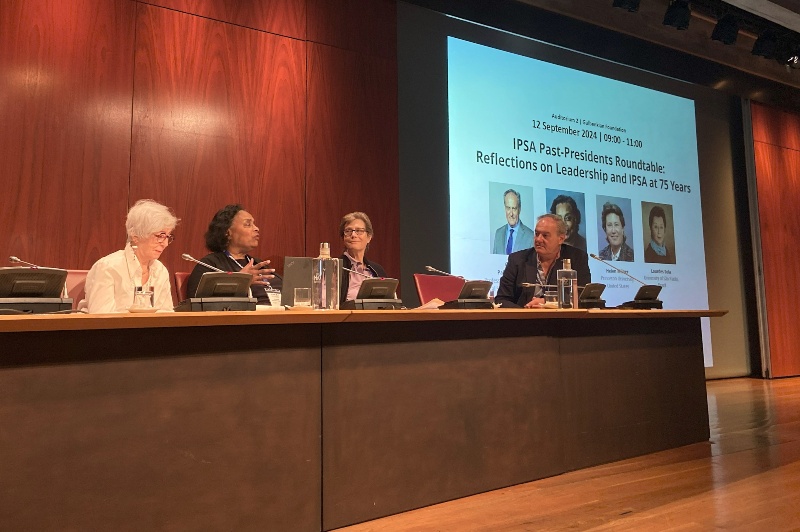

Day 2 at IPSA’s Democratization and Autocratization Conference in Lisbon
Publication date: Mon, 09 Sep 2024
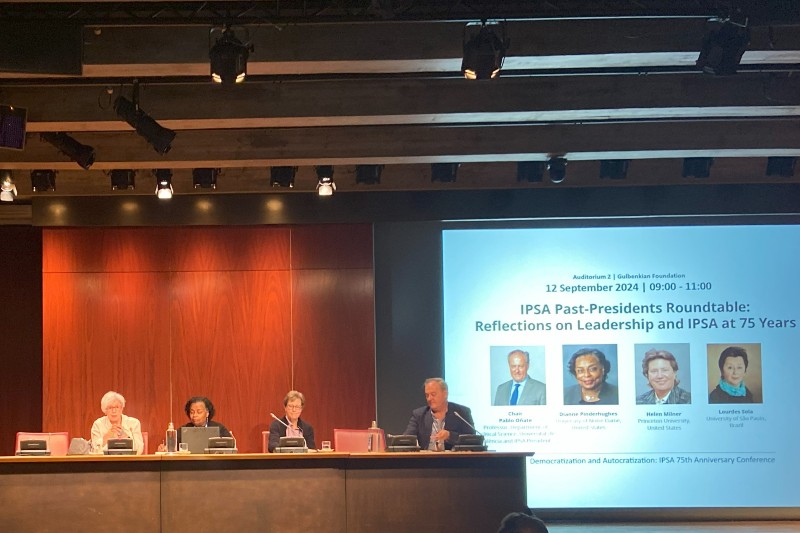
IPSA Past-Presidents Roundtable: Reflections on Leadership and IPSA at 75 Years
Day 2 of the Democratization and Autocratization began with the IPSA Past-Presidents Roundtable: Reflections on Leadership and IPSA at 75 Years. Chaired by IPSA President Pablo Oñate, the session brought together IPSA’s three distinguished women Presidents – Dianne Pinderhughes (University of Notre Dame, United States), Helen V. Milner (Princeton University, United States), and Lourdes Sola (University of São Paulo, Brazil) – to discuss IPSA’s legacy and its scholarly contribution to the global political science community.
Since its founding in 1949, IPSA has made significant scholarly contributions to the global political science community by fostering the development of political science worldwide, promoting collaboration between scholars in emerging and established democracies, and supporting academic freedoms. The speakers talked about the transformation of the association during its 75-year history along with the professionalization of the IPSA Secretariat and its progress toward gender equality.
Lourdes Sola (2006-2009) described the organization's progress in diversity, particularly the increased female representation. Prof. Lourdes also highlighted her role in establishing IPSA's first Summer School in Brazil and advocated for enhanced interdisciplinary collaboration to address challenges such as polarization and climate change.
Helen V. Milner (2012-2014) outlined IPSA's growing internationalization and the establishment of its permanent headquarters in Montréal, Canada, which have enhanced global collaboration and knowledge-sharing. Prof. Milner talked about challenges, such as democratic backsliding, that will need greater interdisciplinary collaboration to address future geopolitical tensions.
Finally, Dianne Pinderhughes (2021-2023) shared some insights into IPSA's evolution, noting the significant progress in diversity and global representation compared to its early, male-dominated days. Prof. Pinderhughes addressed challenges such as managing the impact of the pandemic and discussed the importance of financial sustainability.
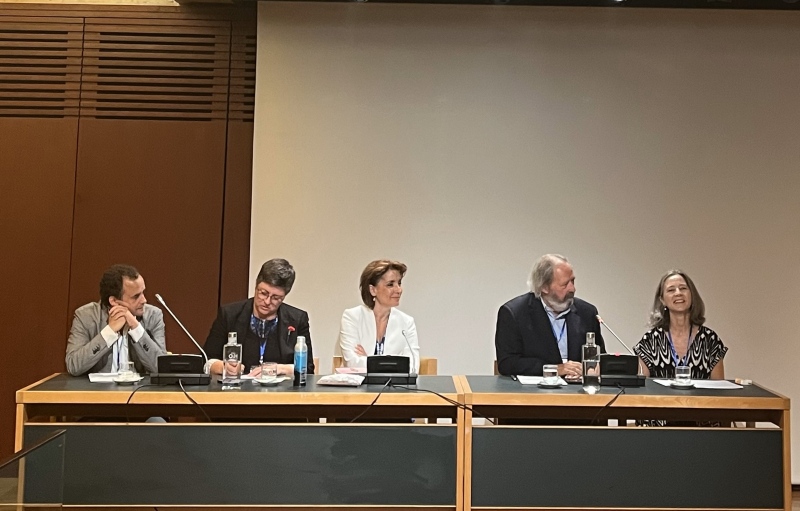
LOC Roundtable: Portraits of Regime Changers in Portugal's Carnation Revolution
Chaired by Madalena Meyer Resende (President of the Portuguese Political Science Association (APCP) and Head of the Local Organizing Committee [LOC), the LOC Roundtable, Portraits of Regime Changers in Portugal's Carnation Revolution, examined the roles of three key regime changers in Portugal's Carnation Revolution: Military Junta strategist, Ernesto Melo Antunes; democratic opposition leader Mário Soares; and Communist Party Secretary-General Álvaro Cunhal.
The roundtable focused on the role played by these political figures in the collapse of Portugal's authoritarian regime and the subsequent transition to democracy. The interaction between these leaders was identified as a key factor in understanding the dynamics of the democratization process. The discussion included insights from Maria Inácia Rezola (School for Media and Communication, LIACOM, Portugal), José Pacheco Pereira (Former Member of Parliament, Portugal), and David Castaño (NOVA University, FCSH, Portugal), who provided analysis of the strategies, challenges, and outcomes of this transformative period.
David Castaño described Mário Soares as a key civilian leader, committed to the advancement of democratic principles. He underscored Soares' dedication to democratic socialism, grounded in European values, and praised his resilience and leadership during exile, as well as his contributions to safeguarding democracy.
José Pacheco Pereira focused on Álvares Cunhal, a prominent and elusive figure in Portuguese politics, whose funeral marked the last major Communist Party demonstration in Europe. Pereira presented Cunhal as a complex leader with no intention of turning Portugal into a “Cuba of Europe.”
Maria Inácia Rezola discussed the role of Ernesto Melo Antunes, a lesser-known figure in Portugal's transition to democracy and the main ideological force behind the Armed Forces Movement (MFA). Antunes was most notable for defending the importance of the military in maintaining Portuguese democracy.
Additionally, Ana Mónica Fonseca highlighted the overlooked significance of Francisco Sá Carneiro, a pivotal figure in Portugal's right-wing politics. Carneiro played a crucial role in opposing the authoritarian regime and shaping the early years of democracy before he died in 1980.
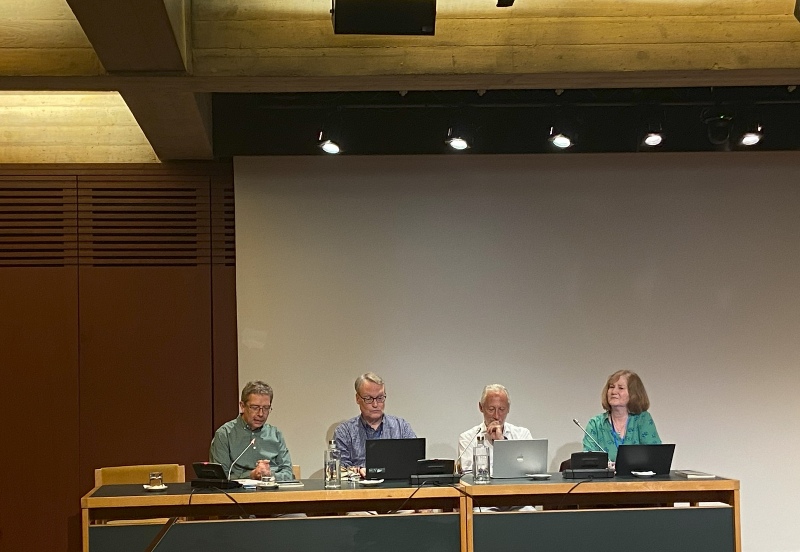
LOC/FLAD Roundtable: Revisiting Juan Linz's Theories of Regimes
Sponsored by the Luso-American Development Foundation (FLAD), another key event on the second day was the LOC/FLAD Roundtable titled Revisiting Juan Linz's Theories of Regimes. Chaired by António Costa Pinto (Institute of Social Sciences, University of Lisbon), the roundtable honored the lasting influence of Juan Linz’s work, particularly his groundbreaking contributions to the study of political regimes. Linz's tripartite theory of regimes was the first to distinguish between totalitarian, autocratic, and democratic regimes and remains a cornerstone of comparative politics. On the 50th anniversary of the third wave of democratization, speakers looked at Linz's conceptual innovations and examined their applicability to the current wave of autocratization. Speakers included Jennifer McCoy (Georgia State University, United States), Andreas Schedler (Central European University, Austria), Giovanni Capoccia (University of Oxford, United Kingdom), and Mark Thompson (City University of Hong Kong, Hong Kong S.A.R).
Giovanni Capoccia discussed the relevance of Linz's distinctions between regime types in understanding contemporary autocratic and hybrid regimes. He provided a critical reassessment of how these categories can be applied to analyze recent authoritarian trends and shifts.
Jennifer McCoy's analysis, based on Linz’s conceptualization of legitimacy, examined how political polarization erodes the legitimacy of democratic institutions. She illustrated how this polarization undermines democracy in countries such as Venezuela, Türkiye, and the United States, linking these dynamics to Linz’s regime typology.
Andreas Schedler discussed the challenges of identifying genuine democratic actors in an era where the concept of democracy has become a universal ideal. He reflected on how Linz's theories help to understand the fluidity of democratic norms and the ambiguities present in the identification of democratic practices.
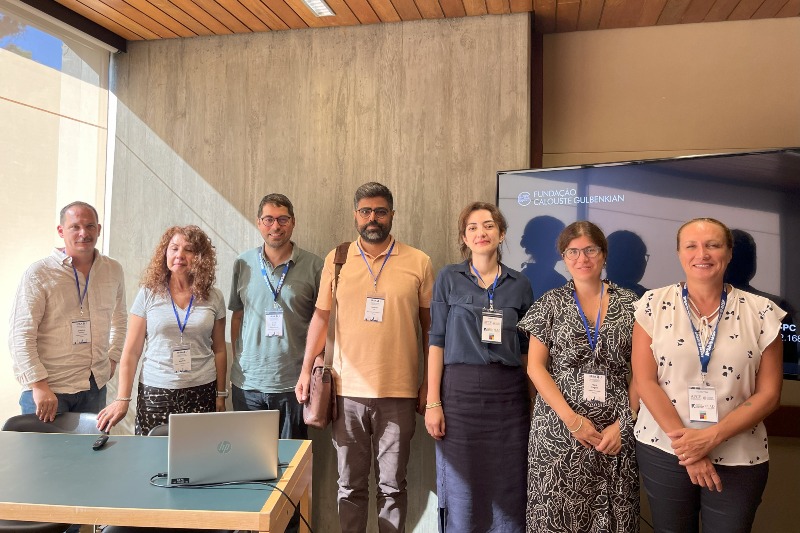
Panels
The second day of the conference featured 30 panels covering a wide range of topics, including the resilience of democratic institutions, the rise of digital authoritarianism, gender and authoritarianism, civilian control during political transitions, and the influence of migration, corruption, and nationalism on democratic and autocratic trends.
IPSA Executive Committee (EC) members once again played an active role in the discussions, contributing as chairs, presenters, and discussants. Hasret Dikici Bilgin, IPSA Summer Schools Coordinator, chaired the panel Türkiye: Democratic Resilience or Ruptures in Autocratization and presented her paper, Regime Survival and Class Politics in Autocratization. On the same panel, EC member Berk Esen also presented his research on Formal Yet Ineffective Opposition Coordination Under Competitive Authoritarianism: The Case of the Nation Alliance in Turkey.
IPSA Past President Lourdes Sola participated in the panel Domestic Institutions and the Management of Autocratic Trends, where she presented her paper, Reassessing Central Bank Doctrine and Practices as Paradigms Shift.
Daniel Stockemer, Co-Editor of the International Political Science Review (IPSR), served as a discussant in the panel The Impact of Increasing Authoritarian Conservatism on Gender Regime in Turkey.
Additionally, IPSA RC-EC Liaison Carmelo Cattafi chaired the panel Citizens and Identities in Democratization/Autocratization Trends, while Prof. Stockemer presented his paper, Are Young Populists Different? Investigating the Relationship Between Age and Populist Attitudes.











